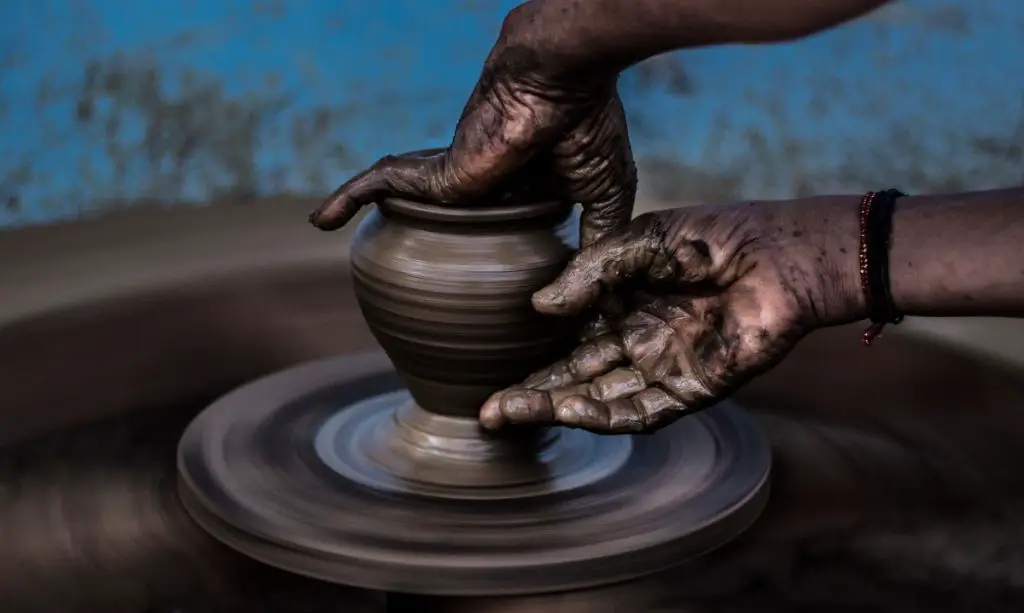How Do You Become A Pottery Artist?
Pottery art involves creating functional and decorative objects like bowls, vases, and sculptures using clay.
To become a pottery artist, you will likely need to pursue formal education like a bachelor’s degree in ceramics or fine arts. You’ll also need to dedicate time to developing the necessary artistic and technical skills through hands-on practice and experimentation with different techniques and materials. Some of the key skills include sculpting, throwing, handbuilding, glazing, and firing clay pieces.
Pursuing a career as a pottery artist offers many benefits. Pottery making is often described as therapeutic, relaxing and meditative. Working with clay is a tactile experience that can help relieve stress and tension.1 The creative process stimulates cognitive benefits and can increase happiness.2 Pottery also allows for creative self-expression and the joy of making something with your own hands.
Education Needed
To become a pottery artist, a minimum high school diploma or GED is recommended. While one can start by being self-taught, most pottery artists pursue some level of formal education to hone their skills and advance their careers. Many obtain an associate’s or bachelor’s degree in fine arts, with a focus on sculpture, ceramics, and 3D design [1]. A college education allows aspiring artists to gain hands-on experience in fully equipped studios under the guidance of expert instructors.
Earning a degree in pottery includes courses in techniques like hand building, throwing, mold making, glaze chemistry, sculpting, and more. Students also develop an artistic style, learn business practices, and make connections within the pottery community. Completing internships at studios or galleries provides valuable real-world training as well [2].
Skills Required
Creativity and imagination are essential for pottery artists. Coming up with unique designs and glazes requires the ability to think outside the box. Fine motor skills allow pottery artists to precisely shape clay and delicately paint details onto finished pieces. The creative process also demands patience and intense focus over long periods of time to perfect each piece. In addition to artistic abilities, pottery artists need business skills like marketing, accounting, and customer service to sell their work and run a successful studio. As the Ceramics Designer – Skills and qualities | Job Information says, “An understanding of colour, shape and form” helps pottery artists conceptualize and produce quality work.
Learn the Fundamentals
To become proficient in pottery, you need to master some fundamental techniques. This includes learning handbuilding methods like coil, slab, and pinch techniques to shape clay into forms and objects. Classes like those offered at Mount Art Academy can teach you these handbuilding fundamentals.
You also need to learn wheel throwing, which involves centering and opening up clay on a potter’s wheel. Throwing takes a lot of practice to master the movements needed to raise and shape clay into vessels and other pieces. Experienced teachers like those at Natusole Studios can provide wheel throwing instruction.
Sculpting clay by hand is another important skill, allowing you to craft decorative and artistic objects. Learning about glazing and decorating finished pieces is also key. Glazes allow you to add color while decorating methods like carving, incising, and painting enable you to embellish pottery.
Develop a Style
Once you have mastered the fundamentals of pottery making, the next step is to develop your own unique style and creative voice. Experimenting with different forms, glazes, and decorative techniques will help you refine your skills and explore new creative possibilities.

Try out new shapes and sizes for your pottery pieces. Play with symmetrical and asymmetrical forms. Use different types of clay and handbuilding techniques to create innovative pieces. Don’t be afraid to break the rules and think outside the box.
Explore a wide range of glazes and surface decoration methods like slip trailing, sgraffito, mishima, carving, stamping, and more. Try combining multiple techniques on one piece to create visual interest. Test out mixing your own glazes and note how different color combinations and textures emerge.
As you become more confident in your technical skills, your own artistic style will start to emerge. Pay attention to what drives you creatively and the visual language that excites you most. Refining your unique voice as a pottery artist takes time and dedication, but bringing your personal vision to life through clay can be incredibly rewarding.
Set Up a Studio
A proper studio setup is essential for pottery artists to be able to create their works. The basics you’ll need include:
- Pottery wheel and tools – This allows you to throw and form clay pieces. Quality wheels like the Brent or Shimpo allow for smooth throwing. Basic tools include rib tools, trimming tools, cutting wires, etc. (https://thenorthernkiln.ca/blogs/handcrafted-canadian-pottery/how-to-start-a-home-pottery-studio)
- Sculpting and drying space – Have tables or countertops for handbuilding and sculpting clay creations. You’ll need areas for works to air dry safely before firing. Shelving units can maximize vertical studio space.
- Kiln for firing – Kilns allow you to permanently set clay pieces by firing them at high temperatures. Popular options are electric kilns or gas kilns. Make sure the kiln size suits the scale of pieces you want to fire.
Pottery studios can be set up in garages, basements, sheds or spare rooms. Make sure to have adequate ventilation, lighting and access to water sources. Begin with the essentials and add tools and space as your pottery skills progress.
Business Considerations
Setting up your business will be key to making pottery your full-time profession. Here are some tips for building your pottery business:
Building a client base and selling your work can start with local art shows, galleries, open studio events, and festivals. Getting exposure and networking will help generate commissions and sales. Consider building an email list and social media following to market new work (Pottery Business Tips).
Leverage marketing and social media by sharing photos and videos of your process and finished pieces. Engage your audience and build connections. Use targeted hashtags and geo-tags to reach potential local customers (Pottery Business Tips).
When pricing your pieces, factor in the cost of materials, firing, your time, as well as what the market can bear. Compare to other local artists with similar styles and experience levels to set competitive pricing. Offer a range of price points. Consider charging hourly rates for custom work (Pottery to the People).
Joining the Community
Taking pottery workshops and classes is a great way to connect with other artists who share your passion for the craft. Classes offer a supportive community where you can get feedback, learn from others, and make connections that can last beyond the course. As noted in an article on Studio Arts Boulder, “Pottery classes offer the opportunity to connect with like-minded individuals who share a passion for the art form. Students inspire and motivate one another as they share feedback, troubleshooting tips, and encouragement.”
Entering local competitions and art shows is another way to get involved in the pottery community. This gives you a chance to showcase your work and get valuable feedback from judges and attendees. According to Ceramic Arts Network, shared studio spaces provide opportunities for communal learning: “Having others around to share knowledge, critique work, and inspire new ideas can be very beneficial to artistic growth.”
Immersing yourself in the pottery community allows you to continuously improve your skills while forming meaningful connections with fellow artists. As noted in The Sheridan Press, “With classes available through the community college and various shops, opportunities to be exposed to the arts abound and communities make no exception for ceramics.”
Continuing Education
Once you have developed your skills and established yourself as a potter, it’s important to continue advancing your education through advanced classes, conferences, and seminars.
Many community colleges, art schools, and pottery studios offer in-depth classes on specific techniques like throwing large pots, using certain glazes, or mastering raku firing. Taking these advanced classes can expose you to new ideas and help refine your skills. For example, Wheel-Thrown Pottery III, Advance Techniques from Udemy offers a thorough approach to using the potter’s wheel for artistic expression.
Attending ceramic arts conferences allows you to learn from and network with other experienced potters. These events often feature workshops by renowned artists along with lectures, demonstrations, and exhibits. Conferences can introduce innovative techniques and breathtaking art to fuel your creativity.
It’s important for potters to continually push themselves to improve, experiment, and stay inspired. Take a workshop on a new decorating method, brush up on your sculpture skills, or learn about the chemistry of glazes – continuing education opens up new possibilities and prevents you from stagnating as an artist.
Career Growth
Once you have honed your pottery skills and established yourself as an artist, there are several avenues to grow your career:
- Sell work at art fairs and online – Setting up a booth at local art fairs is a great way to get exposure and make sales directly to customers. You can also set up an online store or sell through online marketplaces like Etsy to reach a wider audience.
- Open a studio – As your business grows, you may want to open your own pottery studio. This allows you to create and sell work in one location and offer classes. Ensure you understand the zoning, permits and other regulations for operating a studio.
- Teach pottery classes – Many successful potters enjoy teaching others their craft through beginner and intermediate classes. This provides another revenue stream while allowing you to share your passion and skills.
Growing your career as a pottery artist involves being entrepreneurial, expanding your reach, and leveraging your talents as both an artist and instructor. With dedication, creativity, and smart business decisions, you can build a fulfilling and financially sustainable career.

